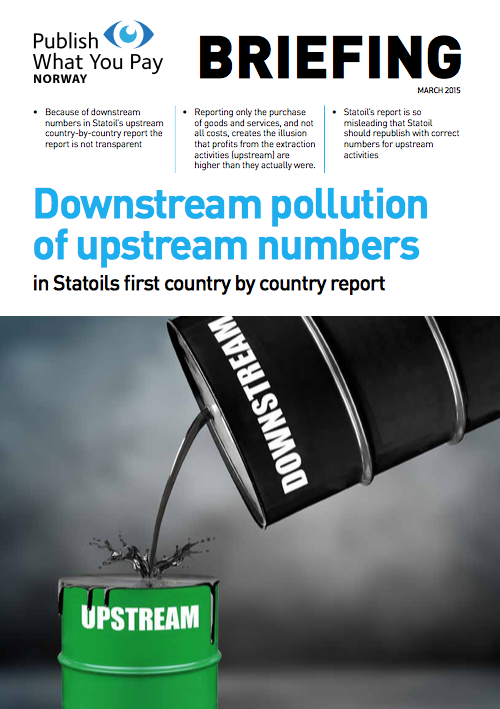
The litmus test is served. Snorre Valen (SV) asks politicians in Parliament to sign a representative proposal for extended country-by-country reporting. Since the Panama Papers, this is one of the most important measures which is not in place yet. The reason for this is the lack of follow-up by the Ministry of Finance on country-by-country reporting for accounting purposes.
Snorre Valen writes this in his representative proposal:
"The purpose of this representative proposal is to secure that the amendment concerning country-by-country reporting (CBCR) to tax authorities is changed so that companies have to report basic accounting numbers. The way the amendment now stands, it allows for adjustments in that certain countries do not have to be reported on. This can be corrected with minor changes in the amendment.
- First of all, the amendment must require that the information concerning income, costs, etc. must be reported regardless of which level of payments have been made to authorities.
- Secondly, the amendment must be changed so that the main numbers in country-by-country reporting are included as a note in the financial statements. This is a simple step, but crucial in ensuring that the reported numbers comply with the revised accounting numbers."
Follow-up is missing from the Ministry of Finance
The background for the proposal is the below petition resolution which was decided upon in Parliament on June 19th, 2015, in connection with the handling of Meld. St. 2 (2014-2015), jf. Innst. 360 S (2014-2015):
"Parliament requests that the government review the effect of the amendment for CBCR reporting as measured against Parliament´s goal of making transparent unwanted tax adjustments and ensuring that relevant information tied to CBCR reporting from subsidiaries and support functions in third countries appear in the accounting. Parliament asks the government to also consider how it can establish oversight with those accountable for reporting according to CBCR regulations."
The proposal received support from a united Parliament. On December 22th, 2016, the government established the changes in the amendment concerning country-by-country reporting. It is crucial to the petition resolution of June 19th, 2015 that Parliament asks the government;
"To ensure that relevant information tied to CBCR reporting from subsidiaries and support functions in third countries appear in the accounting."
The change in the amendment has met with criticism from several parties for not delivering on the goal and Parliament´s intention. The criticism is directed against two matters:
- Current amendment endeavours to ensure that the duty to inform about investments, production, complete income, and all costs only applies to countries where companies have made payments to authorities over the amount of 800,000 NOK. This will effectively excuse many companies from their reporting duty in several areas, since it is common that payments to authorities in tax havens are far below 800,000 NOK. This also creates extensive evasion possibilities.
- The main numbers in CBCR reporting must be captured in notes in the financial statements. This is the only way to ensure that only audited numbers enter into the CBCR reporting, and not fictional numbers.
That the duty to report information on income etc. only applies when connected to a duty to report information concering payments to authorities, is confirmed by the Minister of Finance, Siv Jensen, in her reply to a written question nr. 818 (2016-2017) from representative Snorre Serigstad Valen. As long as this remains the case, it will continue to be possible to avoid the regulations and report numbers that are not tied to actual numbers that have been reviewed by an auditor. Vital pieces of the "puzzle" go missing. Making it difficult to see that Parliament´s intention of "ensuring that relevant information tied to CBCR reporting from subsidiaries and support functions in third countries emerge in the accounting" is taken care of.
Read: The Ministry of Finance is happy with its own effort. What does the Committee on Scrutiny and Constitutional Affairs think? (In Norwegian)
Representative´s proposal
The representative´s proposal aims to make two small adjustments in the existing country-by-country amendment which will ensure that extended country-by-country reporting will finally be put in place.
- Parliament is asking the government to change the amendment concerning country-by-country reporting to ensure that extended information is provided, in line with annual accounts and independent of a materiality limit.
- Parliament is asking the government to change the amendment concerning country-by-country reporting so that it specifies that the principal numbers in the country-by-country reporting are included in the note for the financial statemetns.
Once the existing amendment is adjusted according to the representative´s proposal, Norway will decidedly have the best, most inexpensive, simplest, and most confidence-inspiring law - extended country-by-country reporting - which can make transparent potential unwanted tax adjustments. In other words, show where the money is. The question now is whether or not the politicians really want to know where the money is?
Read the whole proposal: Representive´s proposal from representative of the Parliament Snorre Serigstad Valen concerning measures against a black economy and tax evasion (Temporary) (In Norwegian)
Massive support for an extended country-by-country reporting
PWYP Norway had developed the policy proposal extended country-by-country reporting already back in 2012 and presented it in a report: "An extended country-by-country reporting standard. A policy proposal to the EU. Volume 2".
The proposal previously received support from trade unionists, investors, international think tank, the main organization for financial industry in Norway, civil society organizations, politicians (Labor Party, Socialist Left, Center Party, Green Party), and large international civil society organizations.
Gillian Caldwell, leader of Global Witness, explains why it is so important that Norway introduces extended country-by-country reporting now in PWYP Norway´s Vlog.
- The taxation system requires legitimacy
Irene Johansen (Labor Party), member of the The Standing Committee on Finance and Economic Affairs (Labor Party) states the following:
- In order for the taxation system to function, it must have legitimacy. The tax burden must be fair, and people should experience that they get something back for their tax money. The will to pay the correct amount of taxes is greater if everyone pays their fair share. Because of this, there should be transparency, access possibilities, and democratic debate concerning taxation and capital flow. The Labor Party has long put the fight against tax evasion high on their agenda. In recent years we have gained a majority that support our proposals concerning a public ownership registry to ensure transparent ownership in Norwegian companies, and extended country-by-country reporting, so that Norwegian companies have to report their income with daughter subsidiaries registered in tax havens. We will continue to follow up this work as we go forward.
Significant weaknesses in the current country-by-country amendment
The companies have already reported for the fiscal years 2015 and 2016, including significant weaknesses in the reporting, weaknesses which PWYP Norway has been documenting since the amendment´s inception December 20th, 2013. PWYP Norway has already completed analyses of Statoil´s reporting under the existing CBCR amendment for the two fiscal years the company has reported, in 2014 og 2015.
Read PWYP Norway´s briefings on Statoil´s CBCR reports:
PWYP Norway showed, by using available data from Statoil´s CBC report, that Statoil had mixed downstream numbers in a report about upstream numbers ("Downstream numbers pollute upstream numbers", 2014), and exposed both errors in the reporting and deficient reporting. This formed the basis for and led to media coverage and Parliament debate. The use of data and the attention that followed, caused Statoil to change their reporting the following fiscal year ("What Statoil reported and what Statoil ought to have reported", 2015).
In the briefing "What Statoil reported and what Statoil ought to have reported", PWYP Norway showed that Statoil easily could have reported using a meaningful transparency requirement called extended country-by-country reporting, on just one page. Statoil reported "purchase of goods and services" rather than "costs", however, they cannot alone be faulted for insufficient reporting of costs in this report since they were following a deficient amendment. However, the reporting did show that Statoil can report all the information on one page.
Proceeding with representative proposal concerning extended country-by-country reporting
The representative proposal for an extended country-by-country reporting will first be assigned to a committee. PWYP Norway believes that in this case, that is expected to be The Standing Committee on Finance and Economic Affairs. After that it must be decided who should be prosecutor for the case and a progress plan must be developed.
PWYP Norway will be following the case closely and updating readers on the continued process in news publications and newsletters.
Did you know that...
- Accumulated money in tax havens has risen with 25% since 2009.
- 60% of illegal capital flight occurs through commercial transactions in multinational companies.
- Illegal capital flight increases by 9.4% every year, faster than GDP growth.
As long as companies and individual rich people are allowed to hide their money in tax havens or not pay taxes, there is less money available to maintain a good society to live in. There is less money for culture. Less money for health services. Less money for schools and education. Less for everything. Regular people in regular jobs only have two choices. Either regular people with regular jobs pay even more taxes to try to maintain the welfare society we know today. Or, we must expect fewer services from the government and will be left more to our own devices in order to find solutions to societal needs. The third option, that companies also contribute and that they no longer are allowed to hide in tax havens, is what this proposal is about.
A measure that can make transparent potential unwanted tax adjustments is on the table. Now all that is needed is the political will to install it. Is that will there? Will "your" party and "your" politician do what is needed?


